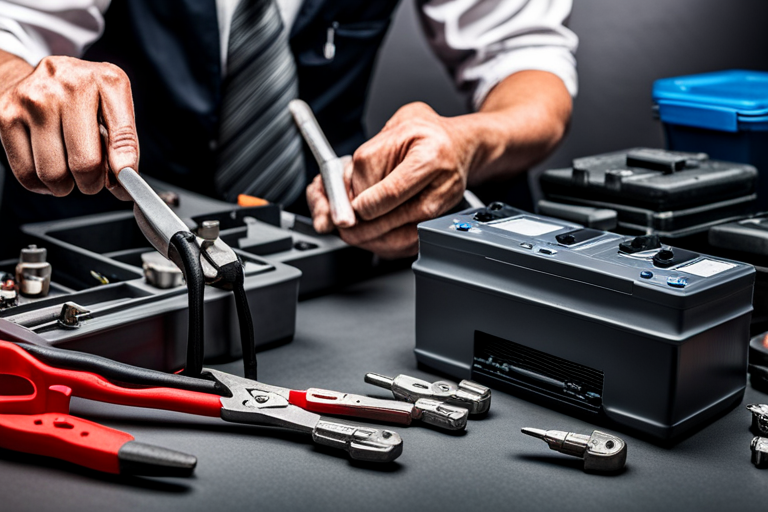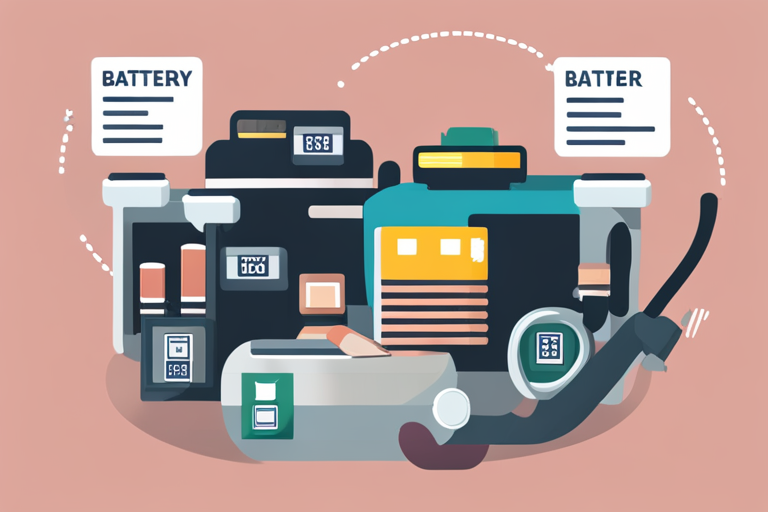How to Choose the Right Car Battery: A Comprehensive Guide 2

Are you tired of replacing your car battery every few years? Do you find yourself stranded on the side of the road with a dead battery more often than you'd like? We all want our cars to run smoothly and efficiently, but sometimes we neglect the very thing that powers our vehicles: the battery. That's why we've compiled a list of 10 tips for extending the lifespan of your car battery, so you can avoid those frustrating and expensive breakdowns.
In this blog, we'll discuss everything you need to know about your car battery. From understanding the inner workings of a battery to recognizing warning signs of a dying battery, we'll cover it all. Our tips range from basic maintenance tasks to advanced techniques, ensuring that you'll find useful information no matter your level of car expertise.
By following our advice, you can save yourself the headache of dealing with a dead battery and prolong the life of your car's power source. So buckle up and get ready to learn how to keep your car battery running smoothly for years to come.
Table Of Content.
- Understanding Car Battery Basics
- Factors to Consider When Choosing a Car Battery
- Types of Car Batteries
- Battery Size and Fitment
- Battery Performance and Lifespan
- Maintenance and Care for Car Batteries
- Troubleshooting Battery Issues
- Battery Recycling and Disposal
1- Understanding Car Battery Basics

1.1 What is a car battery?
A car battery is a rechargeable battery that supplies electrical energy to a vehicle's electrical systems. It provides the energy needed to start the engine and also powers the car's electronics when the engine is off.
1.2 How does a car battery work?
A car battery works by converting chemical energy into electrical energy. When the battery is connected to the car's electrical system, a chemical reaction occurs that produces a flow of electrons. These electrons are then used to power the car's starter motor, which turns the engine over and allows it to start.
1.3 What are the different types of car batteries?
There are several types of car batteries, including lead-acid, lithium-ion, and nickel-metal hydride (NiMH) batteries. The most common type of car battery is lead-acid, which is relatively inexpensive and has a long lifespan.
1.4 What factors should you consider when choosing a car battery?
When choosing a car battery, there are several factors that you should consider, including:
1.4.1 Battery size and type Make sure you choose the correct size and type of battery that fits your vehicle's specifications.
1.4.2 Reserve capacity -The reserve capacity is the amount of time the battery can run on its own without the engine running, should there be an electrical system failure.
1.4.3 Cold cranking amps This refers to the amount of power the battery can deliver to start the engine in cold weather conditions.
1.4.4 Brand reputation It is better to choose a reputable brand to ensure you are getting a high-quality product.
1.4.5 Warranty Choose a battery with a warranty of at least three years to give you peace of mind should there be any issues.
1.5 How to test a car battery?
To test a car battery, you can use either a battery tester or a multimeter. A battery tester is a device specifically designed to check the charge level and functionality of a battery. A multimeter is a more general device and can also be used to check other electrical components in the car.
💡 key Takeaway: There are several factors to consider when choosing a car battery, including size, reserve capacity, cold cranking amps, brand reputation, and warranty. Testing a car battery can be done using a battery tester or a multimeter.
2- Factors to Consider When Choosing a Car Battery

Choosing the right car battery is essential for the optimal performance of your vehicle. The following factors should be considered when selecting a car battery:
1. Battery Size (1)
The size of the car battery is a crucial factor to consider when choosing the right one for your vehicle. A battery that is too small or too large for your car may not function correctly, leading to electrical system problems or even complete breakdown of your car. Therefore, check your car's manual or consult with a professional to ensure you choose the right battery size for your car.
2. Battery Type (2)
There are two main battery types: lead-acid and absorbed glass mat (AGM). The lead-acid battery is the most common type and is typically cheaper. However, AGM batteries tend to perform better on average, offering better power output, greater durability, and longer lifespan. Consider your car's requirements and your budget when choosing between these two types of batteries.
3. Battery Brand (3)
The brand of the battery you choose is also crucial. Well-known brands with a good reputation usually provide better quality batteries that are more reliable and endure longer. Always go for the trusted and reputable brands when choosing a car battery.
4. Reserve Capacity (4)
The reserve capacity of a battery is the length of time that the battery can sustain the vital functions of the car, such as lights, music, and ignition, without the engine running. The higher the reserve capacity, the better. A battery with a higher reserve capacity can give additional time to find a repair shop or reach your destination in case of emergency.
5. Cold Cranking Amps (CCA) (5)
The Cold Cranking Amps (CCA) rating measures the battery's capacity to start the engine when its temperature is low. The higher the CCA rating, the better the battery will perform in cold weather. A battery with a low CCA rating can cause the engine to struggle or not start at all in cold temperatures.
6. Age (6)
The age of the battery is also crucial when choosing the right one for your car. The fresher the battery, the better it will perform. Look for batteries that are less than six months old, as older batteries tend to have lower performance and shorter lifespan.
💡 key Takeaway: When choosing a car battery, consider factors such as battery size, type, brand, reserve capacity, cold cranking amps, and age to ensure optimal
3- Types of Car Batteries

When it comes to car batteries, not all are created equal. There are three main types of car batteries, each with its own unique pros and cons.
1. Lead-acid Batteries
Lead-acid batteries are the most common type of car battery. These batteries use lead plates submerged in an electrolyte solution to produce electricity. They are relatively inexpensive, widely available, and can last up to five years if properly maintained. However, they require regular maintenance, can be heavy, and are not very environmentally friendly.
2. Absorbent Glass Mat (AGM) Batteries
AGM batteries are a newer type of car batteries that use a glass mat soaked in an electrolyte solution to produce electricity. They are becoming increasingly popular due to their durability and longer lifespan compared to lead-acid batteries. They also require less maintenance, are lighter, and are more environmentally friendly. However, they can be more expensive than other types of car batteries.
3. Lithium-ion Batteries
Lithium-ion batteries are the newest type of car battery and use lithium-ion cells to produce electricity. They are extremely lightweight, have a longer lifespan compared to other types of car batteries and are also more energy-efficient. However, they are much more expensive, with prices ranging from $500 to $1,000, and are not yet widely available.
Regardless of the type of battery you choose, it is important to choose one with the correct size, voltage, and reserve capacity to meet your car's needs.
💡 key Takeaway: There are three main types of car batteries: lead-acid, AGM, and lithium-ion. Each has its own pros and cons, and it's important to choose the right type of battery based on your specific needs and budget.
4- Battery Size and Fitment

When it comes to choosing the right car battery, one of the most important factors to consider is the battery size and fitment. In this section, we will discuss how to determine the correct size and type of battery for your vehicle.
1. Look at your car's manual or manufacturer's website: One of the easiest ways to determine the correct battery size and fitment for your vehicle is to consult your car's manual or the manufacturer's website. These resources will provide you with the specific battery group size that fits your car.
2. Check your existing battery: If you're replacing the existing battery on your vehicle, take a look at the label on the battery, which should have the battery group size and other specifications listed. Make sure you choose a battery with the same group size and other specifications as the original battery.
3. Consider the climate: You should also consider your vehicle's operating environment when choosing a battery. In areas with extreme temperature ranges, such as very cold or very hot climates, you may need a battery with higher starting power or a different construction to endure the climate.
4. Consult with a professional: If you're not sure which battery size and fitment is right for your vehicle, it's always best to consult with a professional. A mechanic or auto parts store representative can help you choose the correct battery for your car.
It's important to choose the right battery size and fitment for your car to ensure proper function and durability. By following the tips above, you can determine the correct battery size and type for your vehicle and enjoy worry-free driving.
💡 key Takeaway: Choosing the right battery size and fitment is crucial for a car's proper function and durability. Consult your manual, consider the climate, and seek help from a professional if needed.
5- Battery Performance and Lifespan

When it comes to car batteries, performance and lifespan are two of the most important factors to consider. Here are some key things to keep in mind when making your choice:
1. Cold Cranking Amps (CCAs)
CCAs measure a battery's ability to start in cold temperatures. The higher the CCA rating, the better the battery will perform in colder climates. It's important to choose a battery with a CCA rating that matches the climate in which you'll be driving your car.
(KW: Cold Cranking Amps, battery performance)
"Selecting a high-quality car battery with the right CCA rating for your climate can make all the difference between having a reliable start in the dead of winter or being stranded with a dead battery."
2. Reserve Capacity (RC)
RC refers to how long a battery can sustain power if the alternator fails. This is important because it gives drivers more time to get to a mechanic before the battery dies completely. Choose a battery with a high RC rating for added peace of mind.
(KW: Reserve Capacity, battery performance)
"A car battery with a high RC rating can provide added security, allowing you more time to find help in the event of an alternator failure."
3. Maintenance
Some batteries require regular maintenance, like checking and refilling water levels. This can be time-consuming and frustrating, especially if you're not mechanically inclined. On the other hand, maintenance-free batteries are sealed and require no upkeep.
(KW: Battery maintenance, battery lifespan)
"Consider the time and energy you're willing to put into maintaining your car's battery. Maintenance-free batteries may be a more convenient option if you're looking for something that requires less attention over time."
💡 key Takeaway: When selecting a car battery, pay attention to performance and lifespan factors like CCA ratings, reserve capacity, and maintenance requirements to ensure long-lasting reliability and peace of mind on the road.
6- Maintenance and Care for Car Batteries

Maintaining and caring for your car battery is crucial to ensure its longevity and optimal performance. Here are some tips for proper car battery maintenance:
1. Check the water level (if applicable): If you have a flooded battery, check the water level regularly and add distilled water if needed. Don't overfill the battery as it can cause damage.
2. Keep the battery clean: Regularly remove any dirt or debris buildup on the battery terminals, as they can cause corrosion and decrease the battery's effectiveness.
3. Avoid high temperatures: Heat is one of the biggest enemies of car batteries. Avoid parking your car in direct sunlight or in areas with high temperatures for extended periods.
4. Test your battery regularly: Most auto supply stores offer free battery testing services. Testing your battery regularly will help you catch issues before they become bigger problems.
5. Keep your battery charged: If you have a car that's not used frequently, consider investing in a battery tender to keep it charged. A fully charged battery is essential for optimal performance.
6. Replace your battery as necessary: If your battery is more than three years old or showing signs of wear, it's time to replace it. Ignoring a bad battery can lead to bigger problems down the road.
💡 key Takeaway: Proper maintenance and care are essential to ensure the longevity and optimal performance of your car battery.
7- Troubleshooting Battery Issues

Even with proper maintenance, batteries can still encounter issues. It's important to understand the common battery problems and how to troubleshoot them. Here are some of the common battery issues and their potential causes:
1. Battery corrosion
Battery corrosion can prevent your car from starting, and it occurs when the battery posts and terminals accumulate a build-up of acidic material. This corrosion can be removed using a mixture of baking soda and water, or a specialized corrosion-removing solution.
💡 key Takeaway: Battery corrosion can occur due to the buildup of acidic material on the battery terminals and posts. 2. Low battery voltage Low battery voltage can result in slow cranking or no-start conditions. This can occur due to a variety of reasons such as leaving the lights or electronic devices on without the engine running. 3. Dead battery A dead battery can happen when the battery loses its ability to maintain a charge. This can occur due to overuse, exposure to extreme temperatures, or a damaged alternator. 4. Battery sulfation Battery sulfation is the process of sulfur building up on lead plates in the battery, which reduces the battery's capacity to hold a sufficient charge. This issue can be caused by excessive heat, overcharging, or prolonged discharging. 5. Battery acid leakage A leaking battery can cause damage to surrounding components and even pose a risk of acid burns. This can be caused due to age, physical damage or overfilling of the battery cells with electrolyte. To troubleshoot battery problems, it is important to diagnose the exact cause, which could be done through battery voltage and current tests, digital load testing, or battery inspection. If you encounter any of these problems, it is advisable to seek professional help. (Key takeaway): To troubleshoot battery issues, it is important to diagnose the actual root cause using various testing methods and seek professional help if necessary.
8- Battery Recycling and Disposal

One important factor to consider when choosing a car battery is what to do with your old battery once it no longer holds a charge. Proper battery recycling and disposal is critical for environmental safety and sustainability. Here are some things to keep in mind when recycling or disposing of your old car battery:
1. Choose a reputable recycling center: Look for a recycling center that is certified by federal or state agencies and follows strict environmental regulations.
2. Don't dispose of the battery in your household trash: Car batteries can release toxic chemicals when they break down, which can be harmful to the environment and human health.
3. Prepare the battery for recycling: Before recycling the battery, remove any dirt or debris, and place insulating tape over the terminals to prevent electrical shock.
4. Store the battery safely: Store the old battery in a cool, dry place and avoid letting it come into contact with water.
5. Don't attempt to recharge a dead battery: Trying to recharge a battery that is dead or near-dead can be dangerous and can cause the battery to leak toxic chemicals.
6. Follow local laws and regulations: Check your local and state laws regarding the disposal of car batteries to ensure you are following proper procedures.
Proper battery recycling and disposal is crucial for protecting the environment and human health. Taking these steps when disposing of your old car battery can help ensure you are doing your part to help the planet.
💡 key Takeaway: Proper battery recycling and disposal is crucial for environmental safety and sustainability. Choose a reputable recycling center, prepare the battery properly, and follow local laws and regulations to ensure you are disposing of your old car battery in the right way.
Conclusion
In conclusion, choosing the right car battery is crucial for the proper functioning of your vehicle. With the comprehensive guide provided in this blog post, you now have a better understanding of the factors to consider before making a purchase. Remember to always check the size, type, age, and maintenance requirements of the battery before buying. Also, ensure to consult with a professional if you have any doubts or questions. Ready to upgrade your car battery? Visit our website for a wide selection of high-quality car batteries at competitive prices. You can also contact us for personalized recommendations based on your specific vehicle make and model. Don't let a bad battery ruin your driving experience, make the right choice today!
FAQ
What are the worst car batteries?
Many car owners are not aware of how to choose the right car battery. The following article provides a comprehensive guide to help you make the right choice.
What are the best car batteries?
There are a lot of factors to consider when choosing the right car battery, but we've outlined the most important ones here.
What are the worst car battery brands?
The worst car battery brands tend to be the cheapest options, but they often have low quality cells and may not last as long as more expensive options.
What are the worst car battery types?
There are a few car battery types that are known for being more troublesome than others. These include lead-acid, nickel-cadmium, and deep cycle.
What are the worst car battery reviews?
Reviews can be a valuable tool when shopping for a car battery, but they can also be a source of misleading information. To help you make the best decision for your battery, we've compiled the five worst car battery reviews.
What are the best car battery brands?
There is no definitive answer when it comes to the best car battery brands, as it largely depends on personal preferences and the type of vehicle you own. However, some of the most reputable brands that you may want to consider include Bosch, Trojan, and Interstate.
What are the best car battery brands for the money?
There's no single answer to this question as it depends on a variety of factors, including your driving habits, the type of car you own, and the type of battery your car requires. However, some of the most popular and affordable car battery brands include Trojan, Odyssey, and Interstate.
What are the best car battery reviews?
There are many factors to consider when choosing the right car battery, and reviews can be helpful in making a decision. Before you read a review, be sure to understand the types of batteries and the factors that can affect their performance.
What are the best car battery warranties?
Car battery warranties offer protection for your investment in a new or used car battery. They can also help you get a replacement battery if yours is defective. ### Title: How to Choose the Right Car Battery: A Comprehensive Guide Description: Choosing the right car battery is important not only for your car, but for the environment, too. Here are a few things to keep in mind when shopping for a new or used car battery.
What are the best car battery types?
There are a few things to keep in mind when choosing the right car battery for your vehicle. The battery type, battery chemistry, and battery weight are all important factors to consider. The most common car battery types are lead-acid, nickel-cadmium, and lithium-ion. Lead-acid batteries are the oldest type and are the least expensive. They have a longer shelf life but are less efficient than other types. Nickel-cadmium and lithium-ion batteries are more expensive but are more efficient and have a shorter shelf life.
What are the worst car battery brands for the money?
The Worst Car Battery Brands for the Money There are a lot of car battery brands on the market, so it can be hard to decide which one to buy. However, there are a few brands that you should avoid if you want to get the best value for your money. Here are the five worst car battery brands for the money: Odyssey Odyssey is a well-known brand, but their batteries are often not the best quality. Their batteries often have low amperage and low capacity. This means that they will not last as long as other brands, and they will also be more expensive. Interstate Interstate is another well-known brand, but their batteries are often not the best quality.
 ร้านแบตเตอรี่ PKL-Battery
ร้านแบตเตอรี่ PKL-Battery

อีเมล : pkl.battery@gmail.com
TOP เลื่อนขึ้นบนสุด


